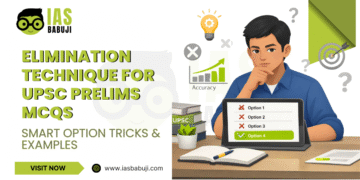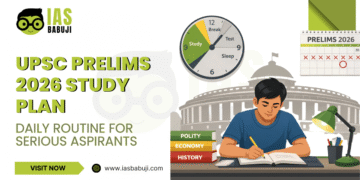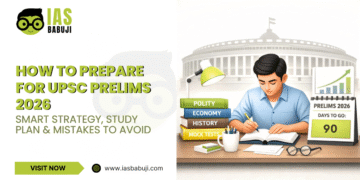How to start preparing for UPSC(IAS) exam? It is probably the first question that pops up in the mind of many aspirants. And there is a good reason for it most of the time, it is the unique style of preparation that bags the selection. The 3 rigorous stages (prelims, mains, and interview) of the selection process add to the exam’s toughness. Despite having a low selection rate(≈1%), lakhs of candidates apply for the exam every year, and this makes a strong yet smart strategy all the more essential. Your knowledge and attitude (personality) will bridge the gap between you and your IAS tag. Jump-start your UPSC preparation with these super easy tips.
- To know the how? first understand the exam!
- How to prepare notes for IAS exam?
- Make realistic plans and execute well
- Correct reference to prepare for UPSC(IAS)
- Revise and be wise
- Mock test for better practice
- Stay healthy while preparing for UPSC
- Bonus Tip
- FAQ | How to start your upsc preparation?
- Editor's Note | How to prepare for UPSC exam
To know the how? first understand the exam!
Before you start preparing for the UPSC(IAS)exam, you should first understand the exam thoroughly. The exam itself took a whole year to get completed and declare results. Every stage of the exam has its own syllabus and question pattern, the final step is, however, an interview wherein your personality traits, problem-solving, and critical thinking abilities are going to put under a test. Let’s understand this exam more:-
- Syllabus:- This should be your first step when you start your UPSC preparation, get familiar with the exam’s syllabus it is vast yet lucid memories it and make your study plan accordingly
- Prelims:- There are 2 papers in the prelims exam, General Studies (GS) and CSAT( civil services aptitude test) it is qualifying in nature, means one only need to score at least 33%, and Paper 1(GS ) is a multiple choice 200 marks paper there is a negative marking of o.66 for every wrong answer. You will need to get the cut-off marks to clear the prelims round. Prelims marks will not contribute to your final ranking.
- Mains:- This stage consists of 9 papers of them 2 are optional, along with 2 qualifying language paper. All tests are of 250 marks and 3 hours duration. The points are allotted based on understanding, content flow, providing practical solutions, and language of answers.
- Interview:- Interview is the final stage of the exam and believed to be the toughest, wherein one panel of experts will ask you questions on various topics, mostly from the syllabus, and they will give you some hypothetical scenario to test your problem solving, and critical thinking abilities in a real-life situation
Your ranking will largely depend on marks scored in mains, and interview. Follow the official UPSC website to get credible information and the latest updates on the IAS exam.
How to prepare notes for IAS exam?

Start with preparing handwritten notes for UPSC(IAS) exam, since they are known to improve cognitive ability in all cases. Also, making your notes will help you in many ways, then getting it from some external source. Make them as informative yet short as possible because you are going to read these notes during your final preparation for the exam. Follow these two ways of making notes.
- Handwritten:- As mentioned earlier, they are probably the best way to make notes. Prefer use of loose sheet (A4 size) to make notes as it would be easier to add any new updates and changes, comparing to that of maintaining a register type copy.
- Digital notes:- Digital notes are more convenient than handwritten notes. And being digital, they could be carried anywhere without extra efforts. It is easy to edit and convenient to make changes, and also remember to add more creative techniques(highlighting, flow chart, diagrams, bullets) of making notes.
Making notes is not an easy task to learn how to make better notes, master it from different sources(youtube, articles, teachers). Always remember to read a topic twice before you start preparing notes for the UPSC(IAS) exam. Also, avoid writing big paragraphs.
Make realistic plans and execute well
Start with preparing and maintaining a to-do list for UPSC(IAS) exam. To ace this exam, you would need a lot of knowledge along with a great strategic approach. Having a planned system to follow will help you to stay on the right path, and it will also act as a progress report. You have to make your plan, hence do not rely on the coaching institute for the same. Make a realistic plan considering your strengths and update the difficulty level each month this way you be more competitive. Things you should add in your strategy.
- Breaks:- Continuous studying is only fruitful if you are not mentally drained. Therefore taking intelligent breaks in between your studies is essential. A 10 minutes break to do what you fond would not harm anyone.
- Practice sessions:- Reading alone will not do any good, have a slot for practice sessions each day, wherein you solve at least 50-100 questions related to that day’s topics.
- Physical activity:- This is a must to have overall good health. Add cycling, jogging, sports, or any other activity that requires some physical movement. Keep your mind and body sharp.
These points should be in your study plan (along with, of course, lots of reading). Remember to be kind to yourself.
Correct reference to prepare for UPSC(IAS)

Begin with the basic NCERT (6-12) textbooks it is believed to be one of the best references to prepare from, due to its simple language and concept understanding. It is necessary to read NCERT but do not rely on one source for your preparation, have multiple references to be up-to-date and exact with the facts. If there are some conflicts in topics from different books, stick to the NCERT version. Ask the toppers to get the best books to prepare for the IAS exam. Two generally used reference modes are online and offline, are compared below.
Online
- Could be accessed anywhere.
- Ebooks, audio files, video lectures as reading and comprehensive method.
- No physical interaction and no insightful feedbacks.
- Self-reliant and time-saving.
- Could cause digital eye pain.
Offline
- Not accessible everywhere.
- Traditional books(hard copy ), notes, offline lectures as reading and comprehensive method.
- Physical interaction with teachers and valuable feedbacks.
- Dependent and time-consuming ( in traveling).
- No digital eye pain.
Revise and be wise
To prepare well for UPSC, you have to cover a vast syllabus, and there are so many things to remember. Here comes the role of revision. A constant reviewing of the concept is essential to keep the topics fresh in mind. Moreover, in any exam, it is more important to retain what you have learned than to complete the whole syllabus, do not keep your revision for the last 2 months, integrate it between your learning process. How? well there you go:-
- Frequent revision:- Revise the learned topic every 7th day, do not keep the revision part beyond the 9th- 15th day, to avoid memory loss. Dedicate separate time to revise every day and a special day for only revision, probably a weekend.
- Three-tier revision:- Probably one of the best methods and recommend by many IAS. In this method, one needs to revise the learned topic on the same day, then 3 days later, and lastly, on the weekend.
- Avail technology:- Use smart methods to revise in your free time, listen to some informative podcasts, Audiobook, or watch short animated series for better visualization. As a result your leisure time will convert into productive hours.
Mock test for better practice

Tests are a great way to evaluate your preparation level and to learn time management during the exam, the prelims exam has only objective type questions, but the mains has both objective and essay type questions. Frequent mock tests would not only help you to learn how to approach an answer but also gives an idea about the areas to improve on, and this will also help you with your revision. There are many online test series available so, do your research and find the best one out. Mock test helps you in different ways, to name some:-
- Confidence booster:- Taking mock tests and acing them gives you a boost of confidence that is incomparable to other techniques. It will keep you motivated throughout the long process of the IAS exam.
- Reality check:- Mock test will give you a reality check on your preparation, the level of your knowledge, and areas in which you need to improve..
- Familiarity with the exam:- Taking these test honestly in an exam like environment will let you get familiar with the exams so that you will not feel overwhelmed during the actual exams. And this will also help in reducing stress during the exam.
Stay healthy while preparing for UPSC

This vital part is undoubtedly ignored by many aspirants while they start preparing for UPSC(IAS) exam. Gaining knowledge is crucial, but not at the cost of your health. A weak body results in a weak mind, hence poor health could lead to improper retention, concentration, and focus. The two aspects of health that you should be watchful are:-
- Mental health:- This exam requires at least 8-10 hours of daily preparation that much consumption of brainpower could be harmful to your mental health. The mixture of broad syllabus, the stress of the exam, and the pressure from surroundings (family, friends, and relatives) add to make the situation worse, as a result things could go overwhelming and might affect your productivity. So, take some time off and seek professional help when needed. Steps that might help:-
- Conscious breathing.
- Meditation.
- Give time to your hobby.
- Talk to a listener.
- Physical health:- Continues studying without proper breaks or rest will only result in poor performance. While preparing for the UPSC exam, aspirants tend to study for months with little to no physical exercise or activity. Such practices degrade the physical health and eventually affect the preparation. Take good care of your body by:-
- Eating healthy.
- Jogging or walks.
- Taking 5-10min breaks and just roaming around, between long Study hours.
- Doing physical activities.
To sum up, physical health and mental health should go hand in hand, focus on making both better and practice activities that integrate both.
Bonus Tip
There is a saying “Don’t dress like the job you have, dress like job you want”. Imagination is the greatest gift of humankind, do not underestimate its power, hence use it to live your IAS dream, confusing? Let me clear it out, start your UPSC preparation with the thought process that you’re already an IAS officer, have an artificial IAS tag(of your name) on your study table and on the door, this will give you the pride and satisfaction to stay motivated from the start till the end of your UPSC preparation. Live the dream and work hard in making it real.
Also check about other UPSC Strategy like How to do Essay Writing, Cracking UPSC in First Attempt, Interview Process of IAS Exam & How to prepare for Prelims Exam.
FAQ | How to start your upsc preparation?
It is suggested to study effectively for at least 8-10 hours daily. Long hours of study with appropriate breaks in between is the right way.
It is not mandatory to take up coaching. Many IAS have cracked the exam with self-study. However, if you feel you’ll need some external support, go for it.
Start a year earlier. It benefits a lot by giving you more time to prepare. For example:- if you are applying for 2021 CSE, then you should start your preparation now!
Editor’s Note | How to prepare for UPSC exam
There is no one-line answer to the question. However, these steps will give you an overview of how to start preparing for the UPSC(IAS) exam and will surely help you with your UPSC preparation to bag that IAS tag, along with these steps focus on why you want to be an IAS? the social reforms you wish to bring and the values you wish to add to the society, etc. Being disciplined and honest will help you throughout the journey of exam and life in general. Lastly, all the best for your exam!







